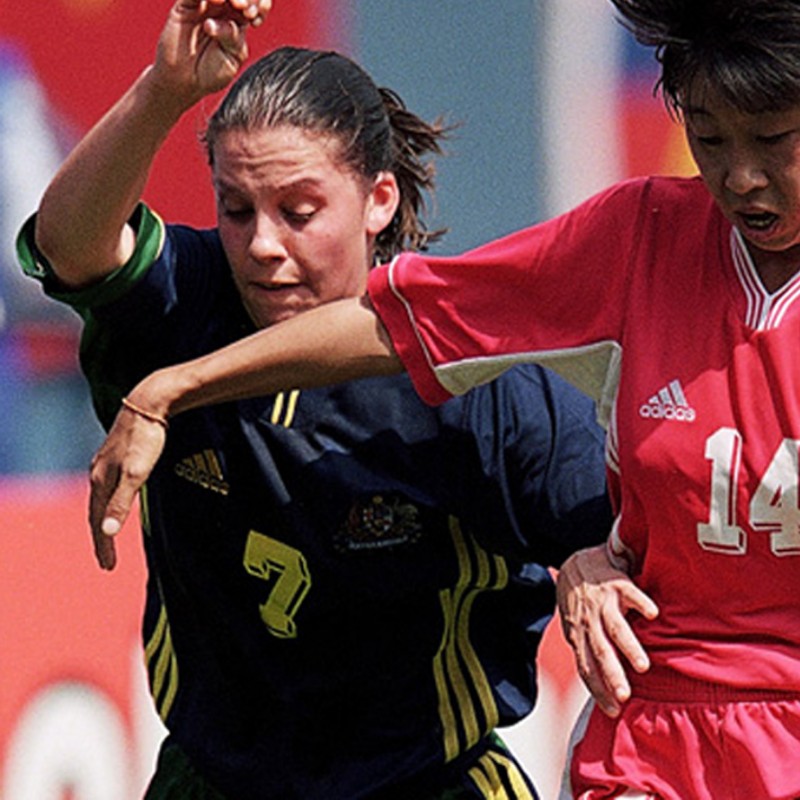26 Jun 1998: TL. Casagrade #7 of Team Australia fights for the ball with J. Bai #143 of Team China during the Womens World Cup game. Team China defeated Team Australia 3-1. Image: Doug Pensinger /Allsport
Former Matilda Lisa Casagrande and Indigenous pioneer John Moriarty have today been inducted into the Football Federation Australia (FFA) Hall of Fame.
The Hall of Fame honours players and participants who have made a sustained and meritorious contribution to Australian football.
Casagrande made her Matildas debut at just 14 years of age before retiring at the tender age of 22, but in those eight years her feats and accomplishments more than merited her induction into the Hall of Fame and regard as one of Australia’s greatest female footballers.
The attacking midfielder’s first match for the Matildas came against Japan in 1994 and a year later she scored in a 3-2 win over Brazil. Casagrande featured at two FIFA Women’s World Cups and became the youngest player to reach 50 international caps, finishing with a total of 64 international appearances and 13 goals.
Moriarty was the first Indigenous player ever selected to represent Australia, although he did not end up taking the field in the green and gold due to the Socceroos’ tour to Hong Kong in 1960 being cancelled because of Australia’s expulsion from FIFA. He later co-founded John Moriarty Football, a foundation that mentors young Indigenous footballers.
“Lisa Casagrande and John Moriarty rightfully join the legends of the game in the Hall of Fame,” said FFA CEO David Gallop.
“Lisa’s story is an amazing one having come into the Matildas at such a young age and then going on to have the impact that she had.
“John’s journey from the Northern Territory community of Borroloola to being selected to represent his country is also remarkable, but it has also been his dedication and commitment to improve opportunities and create pathways for Indigenous footballers through his program John Moriarty Football that marks his contribution to the game.”
In addition to the Football Federation Australia Hall of Fame inductions, Gallop also honoured members of the 1965 Socceroos, the pioneers of Australia’s World Cup journey. This month sees the 50th Anniversary of Australia’s first ever FIFA World Cup Qualification campaign.
Fourteen of the original 20-man squad have gathered in Sydney for their first official reunion, including captain Les Scheinflug, vice-captain Pat Hughes, and fellow players Stan Ackerley, John Anderson, Roy Blitz, Archie Blue, Jim Pearson, Ron Giles, John Roberts, Bill Rorke, Nigel Shepherd, Geoff Sleight, David Todd and John Watkiss.
While not part of the 1956 squad having retired just prior to the trip, legendary goalkeeper Ron Lord was also a part of the reunion.
After preparing in the humidity of north Queensland, the 1965 Socceroos squad played two World Cup qualifiers against a battle hardened North Korean side in Cambodia. The Socceroos were beaten 9-2 on aggregate across the two matches, but the results were put in context when the North Koreans defeated the highly rated Italy in the 1966 FIFA World Cup.
Adding to the legend of the squad, none of the players were full time or paid to play, each provided with only a small amount for food and necessities.
“These pioneers laid the foundations for future World Cup qualifying campaigns and broke new ground under trying conditions and with extremely limited resources as they travelled to play in a place totally foreign to them,” said Gallop.
“Considering the challenges they faced and the magnitude of what they were up against, these trailblazers epitomised what it meant to represent this country. They have and will continue to leave a lasting legacy for Australian football.”
As part of today’s event, Scheinflug, who scored both of Australia’s goals against the North Koreans, was also presented with his Socceroos cap by former Socceroo Brett Emerton, whom Scheinflug coached during his time in charge of the Young Socceroos (Under 20s).
On what is a momentous day for Australian football, today is also the 10th anniversary of that unforgettable night when Australia qualified for the 2006 FIFA World Cup after beating Uruguay in a dramatic penalty shootout at Sydney’s ANZ Stadium, as well as the official farewell for outgoing FFA Chairman Frank Lowy.
FFA Hall of Fame 2015 inductees
Lisa Casagrande
Versatile attacking midfielder Lisa Casagrande from Northern New South Wales was first selected for Australia in a game against Japan at the age of 14 in 1994. In 1995 she scored in Australia’s 3-2 win against Brazil. She represented Australia in the 1995 World Cup, scoring in Australia’s 1-4 loss to USA. Lisa was the first female AIS scholarship holder invited to train with the male AIS team in 1994, alongside future Socceroo captain Lucas Neill, Josip Simumic and Danny Milosevic. A skilful player, she scored regularly in the mid-1990s for Australia against sides like South Korea, Canada, and Netherlands. She bagged four goals during the 1998 World Cup qualifying matches, and one goal in pre-World Cup matches against Canada. In 1998-99, Lisa was top scorer in the national women’s league for Canberra Eclipse. During the 1999 Algarve Cup in Portugal she became the youngest player (at 20) to be awarded 50 Australian caps and played in all of Australia’s matches at the 1999 FIFA Women’s World Cup. Clive Charles, the men’s USA Olympic coach, invited Lisa to join the University of Portland football team. Lisa competed in the National College Athletic Association (NCAA) competition made up of 274 teams, helping Portland make the final four in 2000 and 2001. She was selected for the 2000 Sydney Olympics. By the time of her early retirement two years later at age 22 she had played 64 games for the Matildas, scoring 13 goals.
John Moriarty
John Moriarty (born 1938 in Borroloola, Northern Territory) made his first grade debut in 1956 as a teenager and played football for South Australian First Division teams Port Thistle, Port Adelaide and Adelaide Juventus, as well as playing for Adelaide Croatia alongside St Francis House schoolmates the late Charles Perkins and Gordon Briscoe. In 1960, Moriarty was the first recognised Indigenous Australian to be selected for a national soccer team. He was selected to play in an Australian national team tour to Hong Kong, but the tour was cancelled after Australia’s expulsion from FIFA. Moriarty’s career ended after a collision with a goalkeeper. Moriarty represented the state of South Australia 17 times. After retiring in 1965 due to injury, Moriarty served on the board of Adelaide Juventus (later Adelaide City). He co-founded John Moriarty Football (JMF), an initiative for primary school aged Indigenous boys and girls. JMF’s goals are twofold: to provide the support, training, development and pathways for Indigenous players to succeed in football and to use the sport as a powerful tool to change educational and life outcomes for Indigenous footballers and their families.







